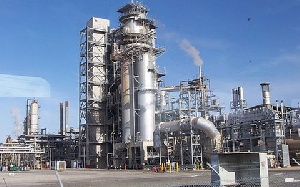A petroleum consultant has claimed that the Tema Oil Refinery (TOR) will need an estimated $200 million for retooling before it can refine the high grade “Sweet Light” crude oil being produced at the Jubilee field.
The consultant, who wants to remain anonymous, submitted, “We will have to do retooling or refitting before we can refine the crude, and the country will need about $200 million to be able to do this.”
According to him, the facility was not built to refine the quality of crude oil the country is producing at the moment, hence the need for it to be upgraded to the current industry standard required for such a job.
TOR, he maintained, was established to process lower grade crudes and could not refine oil from the Jubilee field unless significant investment was made, and that would cost the country huge sums of money.
It is, however, on record that a former Managing Director of TOR, Mr Ato Ampiah, had insisted that TOR had the capacity to process crude from any part of the world.
The Consultant was speaking at a two-day Oil and Gas capacity building workshop for journalists organised by the Ghana News Agency (GNA) in collaboration with Kosmos Energy. The event was aimed at equipping journalists with knowledge and skills needed to report accurately on oil and gas for them to educate with the right stuff.
“We need to be at par with the global industry. If we're able to refine our own oil, it will help save us the transportation cost, time and other benefits,” the Consultant reasoned.
On his part, the Deputy Director of Finance of Kosmos Energy, Mr Kofi Opoku, observed that there was paucity of knowledge and lack of appreciation of basic issues of the oil and gas sector. Thus, Kosmos Energy saw capacity building much as part of its responsibility as an exploratory and production company. And the collaboration was just one way of building that capacity.
Mr Opoku, however, submitted that it could not be gainsaid that Ghana has had its share of changes and development since first oil production began in 2010 relative to benefits.
He said: “The media stand in a unique situation as the fourth real of the estate to be the key propagators and therefore the need to build their knowledge. We have assured all stakeholders of our open door policy and commitment to provide information about the industry for the education of all.”
The debate on whether or not TOR has the capacity to process the crude oil from the Jubilee field begun over three years ago when Ghana started oil production.
Mr Ampiah had contended, “In fact, Jubilee crude will be one of the easiest to be refined by TOR – it is not different from Bonny or Brent and TOR has been processing Bonny and Brent for years so the issue is not that TOR cannot refine the crude – TOR can even with closed eyes refine the Jubilee crude.”
At the time, Mr Ampiah, had emphasised that TOR was expected to have taken delivery of GNPC's second consignment from the Jubilee Field.
Much as he subscribed to the suggestion that the 'Sweet Light' crude first gained enough acceptability internationally following production, he maintained there must be a clear policy on how Ghana wanted to market its crude.
He said it was understandable for managers of the country's oil to want to put enough on the international market in order to establish a brand name for the product before TOR could start refining it.
The Public Affairs Manager of TOR, Ms Aba Lokko, had also refuted claims that OR could not refine the Jubilee Oil.
Ms Lokko said: “The Jubilee Oil falls within the kinds of crude that (TOR) can refine. The Jubilee Oil is the best stock of raw material that the refinery can use for its refining processes, so it is not accurate to say that TOR does not have the technical capabilities. If we bought the crude today, we could refine it today; we do not need to adjust any parameters at all to refine it.”
Dr Thomas Akabzaa, then a Senior Lecturer at the Department of Geology, University of Ghana, told GNA that “TOR has the facility to refine the kind of crude oil being produced from the Jubilee Field.”
According to Dr Akabzaa crude oil could be classified based on the geographical locations, sulfur content and relative weight. He explained that the principal criterion was the location of the crude, since crude came from various parts of the world, and they differed in characteristics.
The Chairman of the Civil Society Platform on Oil and Gas, Dr Steve Manteaw, once told the GNA that he had done studies that confirmed that “TOR can refine the Jubilee Oil because it is light, the very kind of crude that TOR refines.” Dr Manteaw underscored the fact that TOR had even refined the Libyan type of crude, which was heavier.
He indicated, however that it made economic sense to sell the Jubilee Oil on the international market for now because it was of premium quality and very expensive. He cautioned against misrepresenting the capacity of TOR in terms of refining the Jubilee Oil. The bottom line, he expatiated, was that refineries were not built to refine specific crudes.
There is no denying the fact that apart from the employment it generates, refining of crude oil comes with a lot of bi-products that are very useful to all sectors of the economy.
Crude oil contains hundreds of different types of hydrocarbons all mixed together and through distillation in the refining process, these hydrocarbons are separated into various types of fuels.
Business News of Monday, 11 August 2014
Source: Public Agenda













